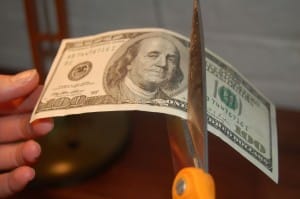Voter pulse on spending cuts and tax increases


According to the latest Rasmussen survey, 75% of Americans believe the lack of spending cuts is largely to blame for the punishing state budget crises. On the other hand, 13% believe taxpayers' reluctance to pay higher taxes is the primary culprit, while 12% are undecided.
These poll numbers corroborate national sentiment as reflected in an earlier February survey in which 83% of Americans blamed the record federal budget deficit on the lack of spending cuts.
The majority of Democrats, Independents, and Republicans continue to blame state budget deficits on the lack of political will to cut excessive spending, though Democrats are a bit more inclined to place the blame on taxpayers unwilling to pay higher taxes.
Most Americans are also opposed to paying higher taxes for specific public services in their states, though they are more open to the prospect of tax hikes in order to preserve education and law enforcement, instead of entitlement programs and state employees.
And as recently as last month, 52% of voters believed tax increases would hurt the economy, while back in December, 58% of Americans opposed a federal bailout for financially-strapped states.
These statistics serve to strengthen an emerging trend toward fiscal conservatism. Americans want the government, at both the federal and state levels, to reject higher taxes and rein in deficit spending. As a result, calls for a second round of stimulus will continue to face stiff headwinds.
Maybe after a ten year borrowing, spending, and money printing spree, Americans are finally prepared to adopt some fiscal austerity, as painful as it may be in the short-term.


